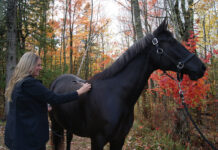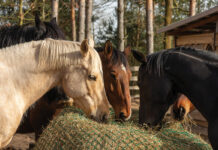 You’ve spent many months planning and waiting for your new foal. It’s important that you take steps to protect him during his first year of life with vaccinations that can keep him healthy and even save his life.
You’ve spent many months planning and waiting for your new foal. It’s important that you take steps to protect him during his first year of life with vaccinations that can keep him healthy and even save his life.
Vaccines given in the first year of life are designed to “prime” the foal’s immune system to respond properly over the next two to three years.
“If you give too many antigens at too young an age, you might not get the protection you’re expecting and the foal could remain at risk for certain diseases during the first few years,” notes Wendy Vaala, DVM, Dipl ACVIM. Dr. Vaala worked for 15 years at New Bolton Center in the neonatal intensive care unit and spent ten years in private practice. Today, she works as a senior equine technical veterinarian for Merck Animal Health, and is also involved in research and development for new equine drugs.
The American Association of Equine Practitioners (AAEP) first revised some of the recommendations for foal vaccinations in the mid-1990s and continues to modify these recommendations. This is why it’s vital to work with your own veterinarian to make sure your foal gets the protection he needs in your region.
Most foals won’t need every available vaccine because some are targeted specifically against diseases in certain regions (Potomac Horse Fever, for instance), or risk situations (such as Strangles). But your foal should at least receive the “core” vaccines and two “at-risk” vaccines, although not all at the same time.
The core vaccines are:
- Eastern & Western Encephalitis
- West Nile Virus
- Tetanus
- Rabies
The recommended at-risk vaccines are:
- Equine Herpes Virus (1 & 4)
- Influenza
With mosquito-borne diseases, such as Encephalitis and West Nile, the foal needs typically needs three doses in the first year of life to get adequate protection. Two doses are typically administered at 4 to 6 week intervals, beginning at 4 to 6 months of age. A third dose is recommended at 10 to 12 months of age prior to the on set of peak mosquito season. In high risk areas, such as the Southeast, or when there is a higher-than-usual mosquito population, the vaccine series might need to start earlier than usual. An example would be the first dose at age 3 to 4 months, the second at 5 to 6 months and the third at 7 to 8 months, followed by a spring booster.
Foals are most at risk for contracting botulism during the first 3 to 4 months of life, so the best way to protect the foal is to incorporate this vaccine into the mare’s pre-foaling vaccinations. Vaccine-stimulated production of anti-botulism antibodies in the mare’s colostrum will provide optimal passive protection for the foal during the period of greatest risk. This is especially important if you live in an area of the country where botulism is a problem, such as parts of Kentucky and Tennessee and the mid-Atlantic region.
Many pet owners routinely vaccinate dogs and cats against rabies, but never think to vaccinate their horses.
“There are an average of 30 to 50 cases of rabies reported in horses every year. By the time a horse shows neurological signs, it’s too late. The danger is also that people are exposed and require post-exposure vaccination. The rabies vaccine is safe, effective, inexpensive and should be given,” cautions Dr. Vaala.
Foals born to rabies-vaccinated mares will need two doses of rabies vaccine administered 4 to 6 weeks apart with the first dose administered when the foal is 6 months of age or older. After the initial series during the first year, horses require only one booster annually.
Young horses are most at risk for influenza when they are between 1 to 4 years of age, so vets usually recommend beginning flu vaccinations when the foal is six months or older. The type of vaccine will determine how and when it is given. For example, the killed virus vaccine given intramuscularly requires a series of two or three doses, while the intranasal modified live vaccine only requires one dose.
Some owners mistakenly think their horses don’t need vaccines if they never leave the farm. Others shy away from vaccinating in an effort to cut costs or because they consider vaccines a “toxin” they don’t want to put in their animals.
“We see problems when animals are not vaccinated. In these hard economic times, we’ve seen larger numbers of Eastern Encephalitis and West Nile cases because owners may have been trying to save money by not vaccinating,” says Dr. Vaala. “Eastern Encephalitis has high fatality rates of greater than 95% and with West Nile, a horse can survive but may have lingering neurological issues. We know what can happen when you don’t vaccinate and you don’t want to play with these risks.
“We encourage horse owners to use the AAEP recommendations and then to talk with their veterinarian to fine-tune the plan for their specific foal’s needs.”
For more information, download the AAEP Vaccination Guidelines for Foals.
Further Reading
Mares and Foals Topiclist





